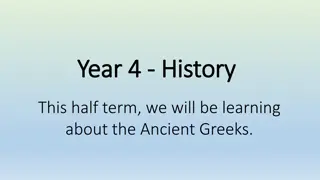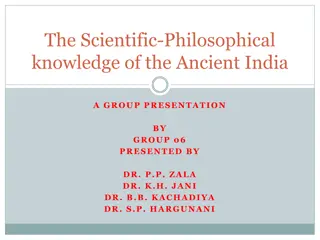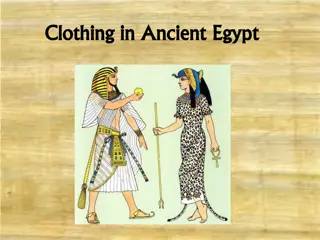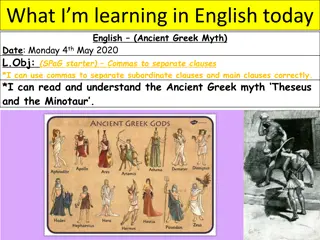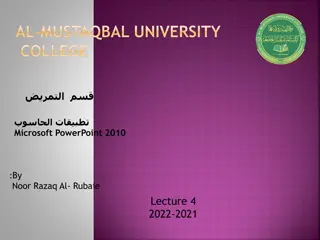
Romans' Views on Jews | Ancient Antisemitism Unveiled
Uncover the historical perspective on Roman attitudes towards the Jewish community, from the origins of antisemitism to key biblical references and insights from Tacitus, a renowned Roman historian. Explore the evolution of anti-Jewish sentiments and the impact of early prejudices in shaping cultural narratives.
Download Presentation

Please find below an Image/Link to download the presentation.
The content on the website is provided AS IS for your information and personal use only. It may not be sold, licensed, or shared on other websites without obtaining consent from the author. If you encounter any issues during the download, it is possible that the publisher has removed the file from their server.
You are allowed to download the files provided on this website for personal or commercial use, subject to the condition that they are used lawfully. All files are the property of their respective owners.
The content on the website is provided AS IS for your information and personal use only. It may not be sold, licensed, or shared on other websites without obtaining consent from the author.
E N D
Presentation Transcript
What Did the Romans Think of the Jews? Ancient Antisemitism
The term antisemitisch (anti-semitic) was first used in 1860, by Jewish scholar Moritz Steinschneider to counter the theories of Ernest Renan that the Aryan race was superior to the Semitic race.
German Antisemitismus was coined in 1879 by German political agitator Wilhelm Marr to replace Judenhass ("Jew- hatred") to make hatred of the Jews seem rational and sanctioned by scientific knowledge.
First Hater of the Hebrew People - : - - . , Exodus 1:10 come, let us deal wisely with them, lest they multiply, and it come to pass, that, when there befalleth us any war, they also join themselves unto our enemies, and fight against us, and get them up out of the land.' , - - , , - , ; , -- - . 11 Therefore they did set over them taskmasters to afflict them with their burdens. And they built for Pharaoh store-cities, Pithom and Raamses. , -
First Judeophobe , -- , ; , - , - Esther 3:8 And Haman said unto king Ahasuerus: 'There is a certain people scattered abroad and dispersed among the peoples in all the provinces of thy kingdom; and their laws are diverse from those of every people; neither keep they the king's laws; therefore it profiteth not the king to suffer them. - - . , , - - - ; , , . - 9 If it please the king, let it be written that they be destroyed; and I will pay ten thousand talents of silver into the hands of those that have the charge of the king's business, to bring it into the king's treasuries.' , -
: , . - , And Balak said unto Balaam: 'What hast thou done unto me? I took thee to curse mine enemies, and, behold, thou hast blessed them altogether.'
- , Proverbs 26:2 ( ) , -- , . As the wandering sparrow, as the flying swallow, so the curse that is causeless shall come home.
Tacitus, Roman Senator Historian lived from 56 to 118CE, Historiae V:3-5
Tacitus, Historiae, p. 1/8 [3] Most authorities, however, agree on the following account. The whole of Egypt was once plagued by a wasting disease which caused bodily disfigurement. So Pharaoh Bocchoris (718-712BCE) went to the oracle of Hammon (Egyptian god) to ask for a cure, and was told to purify his kingdom by expelling the victims to other lands, as they lay under a divine curse. Thus a multitude of sufferers was rounded up, herded together, and abandoned in the wilderness. Here the exiles tearfully resigned themselves to their fate.
Tacitus, Historiae, p. 2/8 But one of them, who was called Moses, urged his companions not to wait passively for help from god or man, for both had deserted them: they should trust to their own initiative and to whatever guidance first helped them to extricate themselves from their present plight. They agreed, and started off at random into the unknown. But exhaustion set in, chiefly through lack of water, and the level plain was already strewn with the bodies of those who had collapsed and were at their last gasp when a herd of wild asses left their pasture and made for the spade of a wooded crag.
Tacitus, Historiae, p. 3/8 Moses followed them and was able to bring to light a number of abundant channels of water whose presence he had deduced from a grassy patch of ground. This relieved their thirst. They traveled on for six days without a break, and on the seventh they expelled the previous inhabitants of Canaan, took over their lands and in them built a holy city and temple.
Tacitus, Historiae, p. 4/8 They avoid eating pork in memory of their tribulations, as they themselves were once infected with the disease to which this creature is subject (leprosy). They still fast frequently as an admission of the hunger they once endured so long, and to symbolize their hurried meal the bread eaten by the Jews is unleavened. We are told that the seventh day was set aside for rest because this marked the end of their toils. In course of time the seductions of idleness made them devote every seventh year to indolence as well
Tacitus, Historiae, p. 5/8 [5] Whatever their origin, these observances are sanctioned by their antiquity. The other practices of the Jews are sinister and revolting, and have entrenched themselves by their very wickedness. Wretches of the most abandoned kind who had no use for the religion of their fathers took to contributing dues and free-will offerings to swell the Jewish exchequer; and other reasons for their increasing wealth way be found in their stubborn loyalty and ready benevolence towards brother Jews. But the rest of the world they confront with the hatred reserved for enemies. They will not feed or intermarry with gentiles. Though a most lascivious people, the Jews avoid sexual intercourse with women of alien race. Among themselves nothing is barred.
Tacitus, Historiae, p. 6/8 They have introduced the practice of circumcision to show that they are different from others. Proselytes to Jewry adopt the same practices, and the very first lesson they learn is to despise the gods, shed all feelings of patriotism, and consider parents, children and brothers as readily expendable. However, the Jews see to it that their numbers increase. It is a deadly sin to kill an unwanted child, and they think that eternal life is granted to those who die in battle or execution - hence their eagerness to have children, and their contempt for death.
Tacitus, Historiae, p. 7/8 Rather than cremate their dead, they prefer to bury them in imitation of the Egyptian fashion, and they have the same concern and beliefs about the world below. But their conception of heavenly things is quite different. The Egyptians worship a variety of animals and half-human, half-bestial forms, whereas the Jewish religion is a purely spiritual monotheism.
Tacitus, Historiae, p. 8/8 They hold it to be impious to make idols of perishable materials in the likeness of man: for them, the Most High and Eternal cannot be portrayed by human hands and will never pass away. For this reason they erect no images in their cities, still less in their temples. Their kings are not so flattered, the Roman emperors not so honored. However, their priests used to perform their chants to the flute and drums, crowned with ivy, and a golden vine was discovered in the Temple; and this has led some to imagine that the god thus worshipped was Prince Liber (Dionysus), the conqueror of the East. But the two cults are diametrically opposed. Liber founded a festive and happy cult: the Jewish belief is paradoxical and degraded.
Tacitus on the Great Revolt Josephus, War says revolt was only by a few thugs. Tacitus says national rebellion, even Parthian Jews helped the Palestinian Jews Josephus, War 6.241 says Titus urges that the Temple be spared. But compare Sulpicius Severus and Bavli Gittin 56b who say Titus demanded destruction of the Temple
Edict of Augustus on Jewish Rights, 1 BC Caesar Augustus, pontifex maximus, holding the tribunician power, proclaims: Since the nation of the Jews and Hyrcanus, their high priest, have been found grateful to the people of the Romans, not only in the present but also in the past, and particularly in the time of my father, Caesar, imperator, it seems good to me and to my advisory council, according to the oaths, by the will of the people of the Romans, that the Jews shall use their own customs in accordance with their ancestral law, just as they used to use them in the time of Hyrcanus, the high priest of their highest god; and that their sacred offerings shall be inviolable and shall be sent to Jerusalem and shall be paid to the financial officials of Jerusalem; and that they shall not give sureties for appearance in court on the Sabbath or on the day of preparation before it after the ninth hour. But if anyone is detected stealing their sacred books or their sacred monies, either from a synagogue or from a mans' apartment, he shall be considered sacrilegious and his property shall be brought into the public treasury of the Romans.
Philo, Against Flaccus For he [Agrippa] had not come to see Alexandria, since he had sojourned in it before, when he was preparing to take his voyage to Rome to see Tiberius, but he desired at this time to take the quickest road, so as to arrive at his destination with the smallest possible delay. 29 But the men of Alexandria being ready to burst with envy and ill-will (for the Egyptian disposition is by nature a most jealous and envious one and inclined to look on the good fortune of others as adversity to itself), and being at the same time filled with an ancient and what I may in a manner call an innate enmity towards the Jews, were indignant at any one's becoming a king of the Jews, no less than if each individual among them had been deprived of an ancestral kingdom of his own inheritance. 30 And then again his friends and companions came and stirred up the miserable Flaccus, inviting, and exciting, and stimulating him to feel the same envy with themselves; saying, "The arrival of this man to take upon him his government is equivalent to a deposition of yourself.
Philo, Against Flaccus VIII 53 Since, therefore, the attempt which was being made to violate the law appeared to him to be prospering, while he was destroying the synagogues, and not leaving even their name, he proceeded onwards to another exploit, namely, the utter destruction of our constitution, that when all those things to which alone our life was anchored were cut away, namely, our national customs and our lawful political rights and social privileges, we might be exposed to the very extremity of calamity, without having any stay left to which we could cling for safety, 54 for a few days afterwards he issued a notice in which he called us all foreigners and aliens, without giving us an opportunity of being heard in our own defence, but condemning us without a trial; and what command can be more full of tyranny than this? He himself being everything accuser, enemy, witness, judge, and executioner, added then to the two former appellations a third also, allowing any one who was inclined to proceed to exterminate the Jews as prisoners of war. 55 So when the people had received this license, what did they do? There are five districts in the city, named after the first five letters of the written alphabet, of these two are called the quarters of the Jews, because the chief portion of the Jews lives in them. There are also a few scattered Jews, but only a very few, living in some of the other districts. What then did they do? They drove the Jews entirely out of four quarters, and crammed them all into a very small portion of one; 56 and by reason of their numbers they were dispersed over the sea-shore, and desert places, and among the tombs, being deprived of all their property; while the populace, overrunning their desolate houses, turned to plunder, and divided the booty among themselves as if they had obtained it in war.
Philo, On the Embassy to Gaius All the synagogues that they were unable to destroy by burning and razing them to the ground, because a great number of Jews lived in a dense mass in the neighborhood, they injured and defaced in another manner, simultaneously with a total overthrow of their laws and customs; for they set up in every one of them images of Gaius, and in the greatest, and most conspicuous, and most celebrated of them they erected a brazen statue of him borne on a four-horse chariot.
Philo, On the Embassy to Gaius as soon as we were introduced into his presence, the moment that we saw him, bent to the ground with all imaginable respect and adoration, and saluted him calling him the emperor Augustus; and he replied to us in such a [ way] that we not only despaired of attaining our object, but even of preserving our lives; (353) for, said he, "You are haters of God, inasmuch as you do not think that I am a god, I who am already confessed to be a god by every other nation, but who am refused that appellation by you." And then, stretching up his hands to heaven, he uttered an insult which it was impious to hear, much more would it be so to repeat it literally. (354) And immediately all the ambassadors of the opposite portion were filled with all imaginable joy, thinking that their embassy was already successful, on account of the first words uttered by Gaius, and so they clapped their hands and danced for joy, and called him by every title which is applicable to any one of the gods.
The End of Caligula Non-Jews in Yavneh set up a pagan altar, which the Jews tore down. Capito, the tax collector, reported an exaggerated version to Caligula. Caligula ordered a colossal statue of himself set up in the Beit Hamikdash. The Jews told Petroius, the Roman governor of Syria, that they would rather die than allow this. King Agrippa persuaded Caligula to give up his plan. Afterwards, Caligula received a letter that the Jews were rebelling and changed his mind.
Italian police inspecting a stolen statue of Caligula
Petronius (died ca. 65 CE), Satyricon 68.8 He [a slave] has only two faults, and if he were rid of them he would be simply perfect. He is circumcised and he snores.
Pseudo-Aero (date unknown ca. 400 CE), Scholia on Horace, Satires 1.9.70 The circumcised Jews: Therefore circumcised because Moyses the king of the Jews, by whose laws they are ruled, became so by the negligence of the physician, and in order not to be the only person conspicuous by this he wanted all to be circumcised.
Strabo (ca. 64 BCE-OI. 20 CE), Geography 16.2.37 [After Moses] from superstition arose ... circumcisions and excisions [i.e., of the females] and other observances of the kind.
Martial (ca. 40-104 CE), Epigrams 7.82 Menophilus' person a sheath covers so enormous that it alone would be sufficient for the whole tribe of comic actors. but while he was exercising himself in the view of the people in the middle of the exercise ground, the sheath unluckily fell off; lo, he was circumcised!
Apion (first half of the first century), cited by Josephus, Against Apion 2.137,140-2 He [Apion] denounces us for sacrificing domestic animals and for not eating pork, and he derides the practice of circumcision Had Apion been asked who, in his opinion, were the wisest and most God-fearing of all the Egyptians, he would undoubtedly have made the admission, 'the priests'; for they, as is said, originally received two commissions from royalty: divine worship and the charge of learning. But all those priests are circumcised, and all abstain from swine's flesh.
Juvenal (ca. 60-130 CE), Satires 6.160 In that country ... where a long-established clemency suffers pigs to attain old age.
Macrobius (flourished ca. 400 CE), Saturnalia 2.4.11 When he [Augustus] heard that among the boys under the age of two years whom in Syria Herod the king of the Jews had ordered to be put to death was the king's own son, he exclaimed: 'I'd rather be Herod's pig than Herod's son.'
Seneca the Younger (ca. 4 BCE-65 CE), Moral Epistles 95.47 Precepts are commonly given as to how the gods should be worshipped. But let us forbid lamps to be lighted on the Sabbath, since the gods do not need light, neither do men take pleasure in soot.
Strabo (ca, 64 BCE-ca. 20 CE), Geography 16.2.40 Pompey seized the city [Jerusalem], it is said, after watching for the day of fasting,55 when the Judaeans were abstaining from all work; he filled up the trench and threw ladders across it; moreover, he gave orders to raze all the walls and, so far as he could, destroyed the haunts of robbers and the treasure-holds of the tyrants.
Seneca the Younger (ca. 4 BCE-65 CE), Concerning Superstition, cited by Augustine, City of God 6.11 Along with other superstitions of the civil theology Seneca also censures the sacred institutions of the Jews, especially the Sabbath. He declares that their practice is inexpedient, because by introducing one day of rest in every seven they lose in idleness almost a seventh of their life, and by failing to act in times of urgency they often suffer loss
Synesius (ca. 373-414 CE), Letters 5 Now it so happened that this [the day before the Sabbath] was the day on which the Jews make what they term the 'preparation'; and they reckon the night, together with the day following this, as a time during which it is not lawful to work with one's hands. They keep this day holy and apart from the others, and they pass it in rest from labor of all kinds. Our skipper accordingly let go the rudder from his hands the moment he guessed that the sun's rays had left the earth, and throwing himself prostrate ['Allowed to trample on him what sailor so desired.' We, who at first could not understand why he was thus lying down, imagined that despair was the cause of it all. We rushed to his assistance and implored him not to give up the last hope yet. Indeed, the greatest waves were actually menacing the vessel, and the very deep was at war with itself To people who are at sea in such a crisis, life may be said to hang by a thread only, for if our skipper proved at such a moment to be an orthodox observer of the Mosaic law, what was life worth in the future? Indeed, we soon understood why he had abandoned the helm, for when we begged him to do his best to save the ship, he stolidly continued reading his roll. Despairing of persuasion, we finally attempted force, and one staunch soldier - for many Arabs of the cavalry were of our company - one staunch soldier, I say, drew his sword and threatened to behead the fellow on the spot if he did not resume control of the vessel. But the Maccabean in very deed was determined to persist in his observances. However, in the middle of the night he voluntarily returned to the helm. 'For now he said, 'we are clearly in danger of death, and the law commands.


